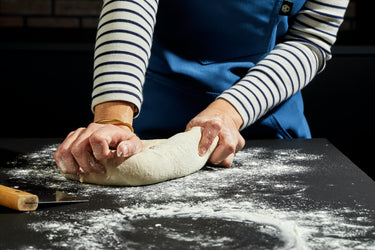Is It Gluten-Free? Answers To Common Questions About Gluten In Foods

Gluten, a protein found in wheat, barley, and rye, acts as a binding agent in many recipes, as well as providing elasticity and structure to baked goods. Because gluten plays a crucial role in the texture and consistency of so many foods, it is a staple in cooking and baking the world-over. However, individuals with celiac disease or non-celiac gluten sensitivity can’t eat this food at all.
Celiac disease is an autoimmune disorder in which ingesting gluten damages the small intestine, leading to malabsorption of nutrients. Non-celiac gluten sensitivity or gluten intolerance is not an autoimmune disorder, but rather a term given when your body doesn’t react well to gluten but doesn’t test positive for celiac disease. What does this mean? For people with celiac disease as well as people with non-celiac gluten sensitivity, this means avoiding foods with gluten in them.
While this might seem like a problem for a limited set of people, many family members and friends of the gluten intolerant will also want the information about what is or isn’t gluten free.
What are gluten free foods?
Many foods, like rice, quinoa, beans, corn, eggs, and dairy are naturally gluten-free. However, because of processing, cross-contamination, or combination in recipes or packaged foods, many foods aren’t reliably gluten-free. In this case, it’s good to look for a symbol on the package that says certified gluten-free, and/or to ask at a restaurant about allergens. Some foods have had gluten removed, however these are not considered reliably safe for people with celiac disease.
Determining what is gluten-free can be challenging due to hidden sources of gluten and cross-contamination risks. This complexity extends beyond obvious culprits like bread and pasta, infiltrating various processed foods and restaurant dishes.
Below you’ll find answers to commonly asked questions about gluten in foods. Though the list is not comprehensive, we hope it will help you navigate gluten-free drinking and eating, whether for yourself or to share with a gluten-sensitive loved one.
Is rice gluten-free?
Yes, rice is naturally gluten-free. It's a versatile staple that can replace gluten-containing grains in many dishes.
Is oatmeal gluten-free?
While oats themselves are gluten-free, cross-contamination is common during processing. Look for certified gluten-free oats to ensure safety.
Is quinoa gluten-free?
Yes, quinoa is gluten-free. As a grain-like seed, it makes for an excellent alternative to wheat-based grains in salads, bowls, and side dishes.
Are potatoes gluten-free?
Yes, potatoes are naturally gluten-free. Enjoy them in various forms, from baked to mashed.
Is sourdough bread gluten-free?
no, traditional sourdough bread is made with wheat flour. However, gluten-free sourdough options using alternative flours like buckwheat, millet, corn, rice, and quinoa exist.
Is corn starch gluten-free?
Yes, corn starch is gluten-free and a common thickening agent in gluten-free recipes.
Is buckwheat gluten-free?
Despite its name, buckwheat is gluten-free. buckwheat is actually a seed-like grain, and makes for a nutrient-rich alternative in gluten-free baking and cooking.
Is couscous gluten-free?
No, traditional couscous is made from wheat. Opt for gluten-free couscous made from alternative grains like rice or corn.
Is cheese gluten-free?
Most cheeses are naturally gluten-free. However, flavored or processed varieties may contain additives with gluten, so always check labels.
Is popcorn gluten-free?
Yes, plain popcorn is gluten-free. Be cautious with flavored varieties, as additives may contain gluten.
Is wine gluten-free?
Most wines are gluten-free, but some individuals may react to trace amounts. Ifi you're concerned, it's advisable to choose wines made in gluten-free facilities.
Is vodka gluten-free?
Pure distilled vodka is generally considered gluten-free. However, flavored or infused vodkas may contain gluten, so read labels carefully.
Is risotto gluten-free?
Traditional risotto uses arborio rice, which is gluten-free. However, be cautious with restaurant preparations, as they may include gluten-containing additives.
Is corn gluten-free?
Yes, corn is naturally gluten-free. Corn and corn products are safe for those on a gluten-free diet.
Are tortilla chips gluten-free?
Many tortilla chips are gluten-free, but cross-contamination can occur during processing. Choose certified gluten-free options for safety.
Is chocolate gluten-free?
Pure chocolate is generally gluten-free, but always check labels, especially for added ingredients.
Is brown rice gluten-free?
Yes, brown rice is naturally gluten-free and a nutritious staple in gluten-free diets.
Is white rice gluten-free?
Yes, white rice is gluten-free. It's a versatile option for gluten-free cooking and meal preparation.
Is peanut butter gluten-free?
Most pure peanut butter is gluten-free, but check labels for added ingredients that may contain gluten.
Is butter gluten-free?
Yes, butter is gluten-free. It's a safe ingredient for cooking and baking in gluten-free recipes.
Is bourbon gluten-free?
Pure distilled bourbon is generally gluten-free. However, flavored or blended varieties may contain gluten, so check labels.
Is panko gluten-free?
Traditional panko is made from wheat, but gluten-free alternatives using rice flour or other substitutes are available.
Is yeast gluten-free?
Pure yeast is gluten-free. However, always check labels for any added ingredients that may contain gluten.
Is orzo gluten-free?
No, orzo is a pasta made from wheat. Choose gluten-free alternatives made from rice or corn for a suitable substitute.
Is granola gluten-free?
Not all granolas are gluten-free. Look for certified gluten-free options, as many contain oats that may be cross-contaminated.





